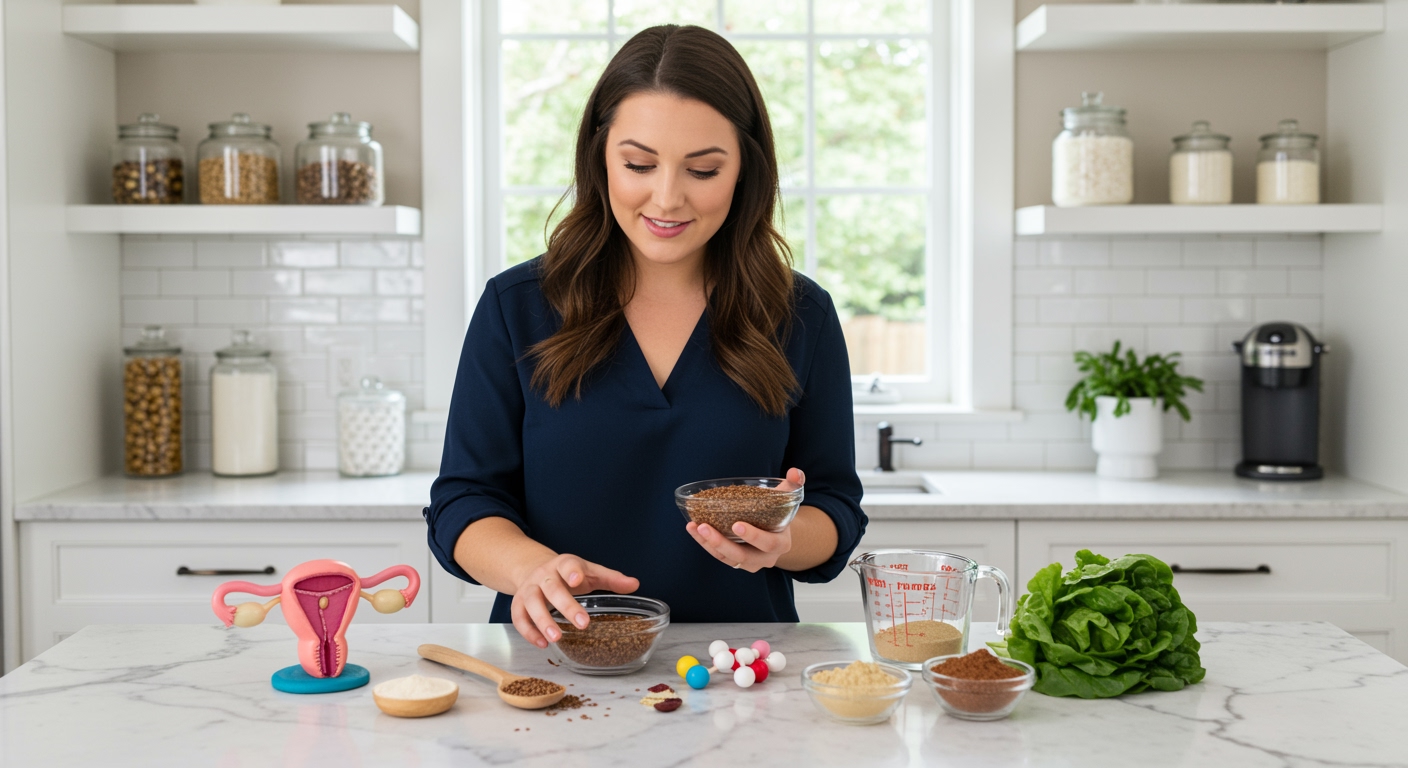✪ Key Takeaway: Flax seeds are generally safe for PCOS and may help balance hormones through their omega-3 fatty acids and lignans.
Introduction
You sprinkle flax seeds on your yogurt every morning, hoping they will fix your PCOS symptoms.
But then you read conflicting information online about whether these tiny seeds are actually safe for your already complicated hormone situation.
Hi, I am Abdur, your nutrition coach and today I am going to explain whether flax seeds are truly safe for PCOS hormones and how they actually affect your body.
What Makes Flax Seeds Different From Other Seeds?
Flax seeds contain the highest concentration of lignans among all plant foods.
These lignans are phytoestrogens, which means they can mimic estrogen in your body but with much weaker effects.
When you eat flax seeds, your gut bacteria convert these lignans into enterolactone and enterodiol.
These compounds can bind to estrogen receptors and either increase or decrease estrogenic activity depending on your current hormone levels.
Flax seeds also provide alpha-linolenic acid, an omega-3 fatty acid that helps reduce inflammation throughout your body.
This anti-inflammatory effect is particularly important for women with PCOS because chronic inflammation worsens insulin resistance and hormone imbalances.
✪ Fact: One tablespoon of ground flax seeds contains about 1.8 grams of omega-3 fatty acids.
How Do Flax Seeds Affect PCOS Hormones Specifically?
Research shows that flax seeds can help lower testosterone levels in women with PCOS.
A study found that women who consumed 30 grams of flax seeds daily for 12 weeks experienced significant reductions in total and free testosterone.
The lignans in flax seeds increase the production of sex hormone-binding globulin (SHBG), which binds to excess testosterone and makes it less active.
Higher SHBG levels mean less free testosterone circulating in your bloodstream, which can reduce symptoms like acne, hair loss, and excess body hair.
Flax seeds also help improve insulin sensitivity, which is crucial for managing PCOS.
Better insulin sensitivity means your body needs less insulin to manage blood sugar, which reduces the signal for your ovaries to produce excess androgens.
✪ Pro Tip: Grind flax seeds fresh before eating them to maximize nutrient absorption and hormone benefits.
Are There Any Safety Concerns With Flax Seeds?
Most women with PCOS can safely consume flax seeds without any negative effects on their hormones.
The phytoestrogens in flax seeds are much weaker than your body’s natural estrogen, so they typically do not cause hormonal disruption.
However, if you have estrogen-dominant PCOS (which is less common), you might want to monitor your symptoms when adding flax seeds to your diet.
Some women report temporary digestive changes when they first start eating flax seeds, including bloating or changes in bowel movements.
These effects usually resolve within a few days as your digestive system adapts to the increased fiber intake.
The only real concern is if you consume extremely large amounts (more than 50 grams daily), which could potentially interfere with nutrient absorption due to the high fiber content.
✪ Note: Start with one tablespoon daily and gradually increase to avoid digestive discomfort.
What Is The Best Way To Use Flax Seeds For PCOS?
The optimal dose for PCOS benefits appears to be 1-2 tablespoons of ground flax seeds daily.
Ground flax seeds are better than whole seeds because your body can actually digest and absorb the nutrients from the ground version.
You can add ground flax seeds to smoothies, yogurt, oatmeal, or baked goods without changing the taste significantly.
For maximum hormone benefits, consume flax seeds consistently rather than sporadically.
Store ground flax seeds in the refrigerator to prevent the omega-3 fatty acids from becoming rancid.
Some practitioners recommend consuming flax seeds during the first half of your menstrual cycle (days 1-14) as part of seed cycling, though scientific evidence for this specific timing is limited.
✪ Pro Tip: Buy whole flax seeds and grind them in small batches using a coffee grinder for maximum freshness.
The Bottom Line
Flax seeds are not only safe for most women with PCOS but can actually help improve hormone balance and reduce symptoms.
Small consistent changes in your daily nutrition create the biggest transformations in your long-term health.
I would love to hear about your experience with flax seeds or any questions you have about managing PCOS through nutrition in the comments below.
References
At NutritionCrown, we use quality and credible sources to ensure our content is accurate and trustworthy. Below are the sources referenced in writing this article:
- PMC: Flaxseed and Cardiovascular Health
- PMC: Phytoestrogens and Health
- PubMed: Flaxseed Supplementation and Hormone Levels
- Lesley O’Connor Naturopath: Flax Seeds for PCOS Symptoms





